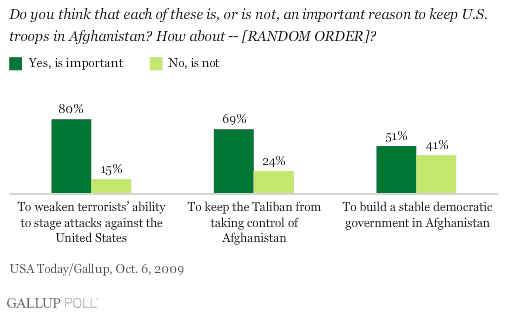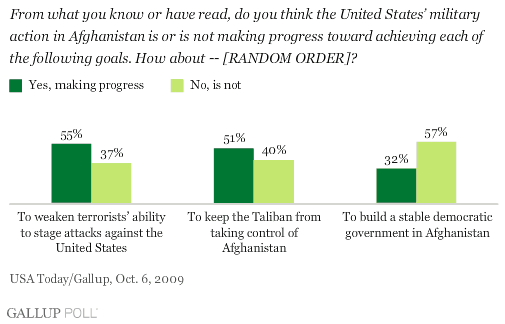PRINCETON, NJ -- As the debate intensifies over the next steps for the United States in the war in Afghanistan, a new USA Today/Gallup poll finds Americans about evenly divided over whether the U.S. should increase its troop presence there. Forty-eight percent say they would favor a decision by President Obama to send more troops, while 45% would oppose it. Two weeks ago, the public leaned against a troop increase.

The Oct. 6 poll was conducted just before the eighth anniversary of U.S. military operations in Afghanistan. President Obama is now considering whether the U.S. should send more troops, something the commanding general in Afghanistan, Stanley McChrystal, recently called for. Other prominent U.S. military leaders support McChrystal's recommendations.
"In a broad sense, Americans agree that there are legitimate reasons to have troops in Afghanistan."
Those recommendations may have contributed to Americans' slightly more supportive position on increased troops. At the same time, the public pronouncements in favor of troop increases have created a bit of a public relations issue for the president, particularly if he ultimately decides to go against the commanders' recommendations.
The poll included a general question about this type of situation, asking Americans whether U.S. military commanders should make their positions publicly known when the U.S. is considering different courses of military action, or keep them private and reveal them only to the president and others in the military chain of command. The public -- by a 2-to-1 margin -- believes it is better for military commanders to keep their positions private.

Republicans (65%), Democrats (65%), and independents (60%) generally agree that commanders should keep their preferences private.
Public Support for U.S. Troops in Afghanistan
The poll indicates that the majority of Americans support a U.S. military presence in Afghanistan in general. In addition to the 48% who favor an increase in the number of U.S. troops there, another 5% oppose it but believe the U.S. should maintain its current troop level. Thirty-eight percent of Americans -- including half of Democrats -- think the United States should begin to withdraw troops from Afghanistan. Republicans solidly back a troop increase, with 7 in 10 in favor.

In a broad sense, Americans agree that there are legitimate reasons to have troops in Afghanistan. For example, the poll finds 80% of Americans saying that weakening terrorists' ability to stage attacks against the United States is an important reason to keep U.S. troops stationed there. Somewhat fewer (69%), but still well above a majority, believe keeping the Taliban from taking control of Afghanistan is an important reason to have U.S. troops in that country. Americans are least likely to think that building a stable democratic government in the country is an important reason to keep U.S. troops in Afghanistan, but a majority (51%) still do.

Americans, however, are far from convinced that the United States is currently making progress toward these goals. Slim majorities think the U.S. is making progress toward weakening terrorist operations and keeping the Taliban from power. Less than one-third see progress toward building a stable democratic government. This might be understandable because nearly two months after the Afghan presidential election, an official winner has not been announced as allegations of fraud are investigated.

Bottom Line
Though Americans are somewhat more supportive of increasing the number of U.S. troops in Afghanistan than they were a few weeks ago, they are still divided on the issue. Thus, the public does not appear to be providing President Obama with clear guidance on how it would like him to handle this difficult issue. Even so, Americans do see legitimate reasons for the United States to keep troops in Afghanistan, although significant proportions doubt that the United States is currently achieving those goals.
Survey Methods
Results are based on telephone interviews with 1,007 national adults, aged 18 and older, conducted Oct. 6, 2009. For results based on the total sample of national adults, one can say with 95% confidence that the maximum margin of sampling error is ±4 percentage points.
Interviews are conducted with respondents on land-line telephones and cellular phones.
In addition to sampling error, question wording and practical difficulties in conducting surveys can introduce error or bias into the findings of public opinion polls.
Polls conducted entirely in one day, such as this one, are subject to additional error or bias not found in polls conducted over several days.
